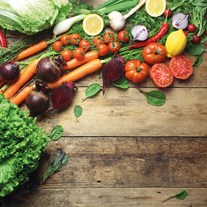
- Soil Association
- Take action
- Organic living
- Seasonal food

Seasonal food
Eating seasonable food is better for the environment.
Seasonal food is food that is naturally ripe and ready for harvest in your local area at a certain time of year.
Eating organic, seasonal food means we don't have to import food from different climates around the world. It helps to make our diets more sustainable and reduce our carbon footprint.
Spring seasonal food
Vegetables
- Asparagus – best in April
- Purple sprouting broccoli – available in early spring
- Spring cabbage – best in May
- Cauliflower – available in early spring
Salads and herbs
- Spring onions
- Watercress
- Spinach
- Parsley
- Lettuce
- Radishes
Fruit
- Rhubarb
What to sow at home in spring
- Cauliflower and cabbages
- Courgettes
- Beans
- Peas
- Pumpkins and squash
- Tomatoes – best to start growing indoors, or sow outdoors later in spring
- Sweetcorn
- Peppers and chillies
- Carrots
- Leeks
- Beetroot
- Chard
Summer seasonal food
Vegetables
- Artichokes
- Courgettes
- Broad beans
- Aubergines – June onwards, but best in July
- Chard – two seasons from June to August, and October to April<
- New potatoes
- Onions - March to August first season
Salads and herbs
- Spring onions
- Watercress
- Spinach
- Parsley
- Rocket – early summer onwards
Fruit
- Raspberries
- Strawberries
- Gooseberries
- Blueberries
- Cherries – mid-June to September
- Peaches – July onwards
- Blackcurrants and redcurrants
- Plums
What to sow at home in summer
- Salad crops – will produce a quick turnaround for harvest – lettuce, radishes (fast-maturing), leafy salads, rocket
- Beetroot – plant in June for September and October
- Brassicas – like kale, pak choi can be planted, along with winter and spring cabbages, winter cabbages in June (last chance), Spring in July/August
- Leeks – can be planted in July
- Radicchio/chicory, swede, celeriac
- Fennel
- Carrots – during June and July
- Peas – including mangetout and snap peas
Autumn seasonal food
Vegetables
- Broccoli
- Leeks
- Chard
- Courgettes
- Cabbage, kale
- Celery
- Peppers
- Sweetcorn
- Winter squash and pumpkins – from October
- Potatoes
- Root vegetables – parsnips, carrots, turnips
Salads and herbs
- Onions
- Garlic
- Cucumbers
- Lettuce
- Spinach
- Fennel
Fruit
- Apples
- Blueberries
- Blackberries
- Figs
- Pears
- Plums
What to sow at home in autumn
- Broad beans
- Fruit trees
Winter seasonal food
Vegetables
- Brussel sprouts
- Cabbage - kale, red cabbage, savoy cabbage,
- Cauliflower
- Leeks
- Potatoes
- Root vegetables - parsnips, carrots, turnips etc.
- Swedes
- Celeriac
- Jerusalem artichokes
Salads and herbs
- Spring onions
Fruit
- Apples - early winter
- Pears - early winter
-
Sign up for a seasonal, organic and local veg box
A great way ensure you are eating seasonally is to subscribe to a fruit, veg or meat box.
Find your nearest box scheme
Take the pledge to eat two meals per week with seasonal food grown in the UK
Take the pledge
Related
![Why organic?]()
![Get your free Organic Living Guide]()
Read more


